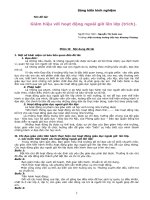- Trang chủ >>
- Cao đẳng - Đại học >>
- Luật
Palestine Yearbook of International Law 2002 2003 Palestine Yearbook of International Law
Bạn đang xem bản rút gọn của tài liệu. Xem và tải ngay bản đầy đủ của tài liệu tại đây (2.04 MB, 642 trang )
The Palestine Yearbook of International Law
THE PALESTINE YEARBOOK
OF
INTERNATIONAL LAW
Volume XII
2002/2003
Martinus Nijhoff Publishers
in Cooperation with
Institute of Law, Birzeit University
The Palestine Yearbook of International Law is published in cooperation with the Birzeit
University Institute of Law, under whose auspices it is edited. Established in 1993, the Institute
of Law is research based and aims to contribute to the modernization of Palestinian legal structures both at the academic and professional levels.
All e-mail correspondence concerning the Yearbook should be sent to the Editor-in-Chief at:
Posted correspondence may be sent to: Attn: Palestine Yearbook of
International Law, BZU Institute of Law, P.O. Box 14, Birzeit, Palestine. Telecommunication
may be directed to the Institute of Law, at: Tel: (972) (2) 298-2009; Fax: (972) (2) 298-2137.
A C.I.P. Catalogue record for this book is available from the Library of Congress.
Printed on acid-free paper
ISBN: 90-04-14360-2
© Copyright 2005 by Koninklijke Brill NV, Leiden, The Netherlands
Koninklijke Brill NV incorporates the imprints Brill Academic Publishers, Martinus Nijhoff
Publishers and VSP.
The Palestine Yearbook of International Law is published once a year. Opinions expressed in
the Yearbook are solely those of their respective authors. Please cite as PAL. Y.B. INT’L L.
All rights reserved. No part of this publication may be reproduced, stored in a retrieval system,
or transmitted in any form or by any means, electronic, mechanical, photocopying, microfilming, recording or otherwise, without written permission from the Publisher.
Authorization to photocopy items for internal or personal use is granted by Brill Academic
Publishers provided that the appropriate fees are paid directly to The Copyright Clearance
Center, 222 Rosewood Drive, Suite 910, Danvers MA 01923, USA. Fees are subject to change.
Editor-in-Chief
Camille Mansour
Consulting Editor
Anis F. Kassim
Assistant Editor
Gail J. Boling
Editorial Board
Gail J. Boling
Anis F. Kassim
Ghassan Faramand
Mudar Kassis
Camille Mansour
Advisory Board
Georges M. Abi-Saab
Badriya Al-Awadhi
Riad Daoudi
Awn Al-Khasawneh
Musa Mazzawi
Muhammad M. Al-Saleh
Moufid M. Shehab
George J. Tomeh
Salah El-Din Amer
Mohammed Bedjaoui
Muhammad H. El-Farra
Ismat Kittani
Anis M. Al-Qasem
Muhammad Y. Olwan
Muhammad Aziz Shukri
TABLE OF CONTENTS
INTRODUCTION
Camille Mansour
IN MEMORIAM
Edward W. SAID (1935-2003)
ARTICLES
International Criminal Justice and Palestine
Introduction to Articles
..........................................................................M. Cherif Bassiouni
1
Relevant Lessons from the Ad Hoc Tribunals
............................................................................William A. Schabas
5
Universal Jurisdiction Unrevisited: The International Court of Justice
Decision in Case Concerning the Arrest Warrant of 11 April 2000
(Democratic Republic of the Congo v. Belgium)
..........................................................................M. Cherif Bassiouni
27
Universal Jurisdiction: How Universal Is It? A Study of Competing
Theories ................................................................Steven W. Becker
49
Universal Jurisdiction in Belgian Law ..................................Eric David
77
Israel’s Violent Attacks on Palestinian Arabs in 1948-49: Qualifying
Crimes in Light of International Law and Consequences
..........................................................Monique Chemillier-Gendreau
117
The United Nations’ Response to Israel’s Seizure of the Gaza Strip
and West Bank
......................................................................................John Quigley
145
Jurisdiction of the International Criminal Court over Human Rights
Violations Committed by Israeli Forces in the Occupied Territories
after July 1, 2002
..............................................................................William Bourdon
165
TABLE OF CONTENTS
SPECIAL DOSSIER
The “Sabra and Shatila” Case in Belgium
Introduction: New Lights on the Sharon Case ..................Chibli Mallat
183
1. Belgium: Act Concerning the Punishment of Grave Breaches
of International Humanitarian Law (Promulgated
February 10, 1999) ............................................................................
191
2. Act Amending Belgium’s Act of 16 June 1993 Concerning the
Punishment of Grave Breaches of International Humanitarian Law
(Promulgated April 23, 2003)............................................................
201
3. Act Amending Belgium’s Act Concerning Serious Violations of
International Humanitarian Law (Promulgated August 5, 2003)
[EXCERPT] ......................................................................................
211
4. Complaint Lodged by Survivors against Israeli Prime Minister Ariel
Sharon, Director General of the Defence Ministry Amos Yaron and
other Israelis and Lebanese Responsible for the Sabra and
Shatila Massacre (June 18, 2001)......................................................
219
5. Conclusion to Pre-Trial Hearings Filed in Belgium before the
Brussels Court of Appeals Chambre des Mises en Accusation
(January 30, 2002) [EXCERPT]........................................................
259
6. Brussels Court of Cassation Decision on Appeals from a
26 June 2002 Ruling by the Brussels Court of Appeals,
Chambre des Mises en Accusation (February 12, 2003) ..................
279
7. Judgment of the Brussels Court of Appeals, Chambre des Mises
en Accusation (June 10, 2003) ..........................................................
285
8. Statement by the Lawyers for the Sabra and Shatila Survivors
Concerning [the 24 September 2003 ] Ruling by the Belgium
Supreme Court (24 September 2003) ................................................
289
LAW REPORTS
JUDICIAL DECISIONS
I. Israeli Cases
1. The Katzir Case (March 8, 2000) ......................................................
291
2. The Flechettes Case (April 27, 2003)................................................
315
3. The Iqrit Case (June 26, 2003) ..........................................................
319
viii
Vol. XII THE PALESTINE YEARBOOK OF INTERNATIONAL LAW (2002/2003)
II. Cases from Other Jurisdictions
1. The Case of El-Ali and Daraz v. the [U.K.] Secretary of State for
the Home Department (Interpretation of Article 1D of the 1951
Convention Relating to the Status of Refugees in the U.K.)
(July 26, 2002) [EXCERPT]..............................................................
329
LEGISLATION
I. Palestinian Law
1. Law No. (1) of 2002 on the Judicial Authority
(Promulgated May 14, 2002) ............................................................
353
2. The Amended Basic Law (Promulgated March 18, 2003)................
377
II. Israeli Law
1. Detention of Unlawful Combatants Law
(Promulgated March 4, 2002)............................................................
405
2. Law of Civil Wrongs (Liability of the State), 5712-1952
(Amended July 24, 2002) ................................................................
409
3. Citizenship and Entry into Israel Law (Temporary Order)
(Promulgated July 31, 2003)..............................................................
413
INTERNATIONAL
LEGAL DOCUMENTS
1. Moratinos’ “NonPaper” on the Taba Negotiations (Summer 2001)..
417
2. “The Beirut Declaration” of the Council of the League of Arab States
at the Summit Level, at Its 14th Ordinary Session
(March 28, 2002) ..............................................................................
425
3. A Performance-Based Road Map to a Permanent Two-State Solution
to the Israeli-Palestinian Conflict (April 30, 2003) ..........................
427
4. “Declaration” of the Conference of High Contracting Parties to the
Fourth Geneva Convention (December 5, 2001) ..............................
433
5. U.N. Security Council Resolution 1397 (March 12, 2002) ..............
437
6. U.N. Security Council Resolution 1402 (March 30, 2002) ..............
439
7. U.N. Security Council Resolution 1403 (April 4, 2002) ..................
441
8. U.N. Security Council Resolution 1405 (April 19, 2002) ................
443
ix
TABLE OF CONTENTS
9. U.N. Security Council Resolution 1435 (September 24, 2002) ........
445
10.Report of the U.N. Secretary-General Prepared Pursuant to General
Assembly Resolution ES-10/10 (“Jenin Report”) (July 30, 2002)
[EXCERPT] ......................................................................................
447
11.Office of the U.N. High Commissioner for Refugees “Note on the
Applicability of Article 1D of the 1951 Convention Relating to the
Status of Refugees to Palestinian Refugees” (October 10, 2002) ....
467
12.Mission Report by Ms. Catherine Bertini, Personal Humanitarian
Envoy of the U.N. Secretary-General, 11-19 August 2002
(August 19, 2002) ..............................................................................
473
13.Report of the U.N. Special Rapporteur on Adequate Housing as a
Component of the Right to an Adequate Standard of Living,
Mr. Miloon Kothari, on His Visit to the Occupied Palestinian
Territories, 5-10 January 2002 (June 12, 2002) ................................
501
14. Report of the Special Rapporteur of the U.N. Commission on Human
Rights, Mr. John Dugard, on the Situation of Human Rights in the
Palestinian Territories Occupied by Israel Since 1967, Submitted in
Accordance with Commission Resolutions 1993/2A and 2002/8
(December 17, 2002) ........................................................................
527
15.Concluding Observations of the Committee on the Rights of the
Child: Israel (October 9, 2002)..........................................................
543
16.Concluding Observations of the Committee on Economic, Social
and Cultural Rights: Israel (May 23, 2003) ......................................
555
17.Concluding Observations of the Human Rights Committee: Israel
(August 5, 2003) ................................................................................
563
BOOK REVIEWS
1. The Oslo Accords: International Law and the Israeli-Palestinian
Peace Agreements
Geoffrey R. Watson
Reviewed by ........................................................Naseer H. Aruri
569
2. The Occupation of Justice: The Supreme Court of Israel and the
Occupied Territories
David Kretzmer
Reviewed by ........................................................Anis F. Kassim
575
3. New Perspectives on Property and Land in the Middle East
Edited by Roger Owen
Reviewed by ......................................................Anthony Watson
581
x
Vol. XII THE PALESTINE YEARBOOK OF INTERNATIONAL LAW (2002/2003)
4. Palestine and International Law: Essays on Politics and Economics
Edited by Sanford R. Silverburg
Reviewed by ........................................................Nicolas Jacobs
585
5. Palestinian Refugees: The Rights of Return
Edited by Naseer Aruri
Reviewed by ......................................................Stéphanie David
589
BIBLIOGRAPHY
1. Books ................................................................................................
595
2. Articles ..............................................................................................
598
INDEX VOLUME XII
1. Index ..................................................................................................
605
2. Table of cases ....................................................................................
621
xi
INTRODUCTION
This volume of the Yearbook is devoted to the theme of international criminal justice, a fast-developing area of international law with immediate relevance to
Palestine and the Palestinians. From the late 1980s, Palestinian human rights
organizations in the Occupied Territories were invoking the duties of High
Contracting Parties to the Fourth Geneva Convention 1949 to ‘seek out and prosecute’ perpetrators of grave breaches of the Convention, urging the exercise of
universal jurisdiction by third party states in defence of the most basic rights of
the civilian population, under attack by the Occupying Power. In 2001, survivors
of the Sabra and Shatila massacre lodged complaint against Ariel Sharon and others under domestic Belgian law on the punishment of grave breaches of international humanitarian law. In the meantime, we have seen the establishment of the
Ad Hoc International Criminal Tribunals for the former Yugoslavia and for
Rwanda, as well as more recently the Special Court for Sierra Leone. The
jurisprudence of these tribunals, as well as the Rome Statute and the developing
work of the International Criminal Court, provide deep and fertile territory for
exploration by those who seek to describe Israeli practices in the Palestinian territories according to international norms and by those who attempt to invoke the
sanction of the criminal law against aggressors acting, until now, with impunity
in the name of military and political power, and so to deter the commission of the
kind of crimes inflicted on so many peoples around the world.
In this twelfth volume of the Yearbook we accordingly present a set of seven
articles by renowned human rights and international law scholars and legal practitioners. We are honoured this year to publish an introduction to these articles by
Cherif Bassiouni, and thank him for his continuing interest in and commitment to
the Yearbook. Following the articles comes a Special Dossier of material from the
‘Sabra and Shatila case’ in Belgium, presented by Chibli Mallat, who represented some of the petitioners in the case and who presents insights and findings in
his introduction to the documents.
Moving away from the theme of international criminal justice, our Law
Reports section provides the reader with a selection of Israeli cases and one from
the UK regarding British interpretations of the Refugees Convention. English
translations of the text of the long-awaited Palestinian Basic Law, as promulgated in March 2003, and the 2002 Law of the Judicial Authority are provided in full
in the Legislation Section, along with a number of recent Israeli laws of particular interest from a human rights perspective. Some seventeen international legal
documents follow, mostly from UN bodies and agencies from 2002 and 2003, but
including also the text of the Road Map, which is notable inter alia for its lack of
INTRODUCTION
reference to the existing framework of international humanitarian law, and the
Declaration of High Contracting Parties to the Fourth Geneva Convention from
December 2001, when they met in conference, in response to a UN resolution
taken in emergency session, to consider the duty of state parties to ‘ensure
respect’ by Israel, the Occupying Power, for the terms of the Convention in its
treatment of the occupied population. In this section we also include the Beirut
declaration of the Council of the Arab League, and the ‘non-paper’ on the Taba
talks prepared in the summer of 2001 by Miguel Moratinos, EU Special
Representative to the Middle East Peace Process. This last, an informal record of
the Taba talks, is published in follow-up to our publication in the last volume of
the Yearbook of the ‘non-paper’ presented by the Israeli delegation to the
Palestinian negotiating team during the course of the Taba talks. Our final section
comprises books reviews on five major publications from 2000-2002 on various
aspects of Palestine and the law.
This volume is dedicated to the memory of Edward Said, whose loss is felt
deeply by all those involved in the Yearbook, but whose work and effort continues to inspire.
Camille Mansour
xiv
IN MEMORIAM
EDWARD W. SAID
1935-2003
“INTERNATIONAL CRIMINAL JUSTICE
AND PALESTINE”
AN INTRODUCTION
M. Cherif Bassiouni*
The Palestine Yearbook of International Law has, since its inception, been a widely-read scholarly journal. The contributions made to its eleven prior volumes, as
well as to this twelfth volume, are by highly renowned experts whose works have
been published in many countries.
The selection of articles in this volume, as well as in prior volumes, evidences
the particular interest of the Yearbook in international legal issues relevant to the
Palestinian conflict, which tragically and regrettably has been ongoing for over
half a century. This volume, in particular, addresses a number of issues relevant
to international criminal justice.
Professor William Schabas, a world-renowned scholar and Director of the
Irish Centre for Human Rights at the National University of Ireland – Galway,
who has written extensively on international criminal justice and who is the
author of a major book on genocide, has contributed a significant and thoughtful
article on crimes against humanity. The subject of crimes against humanity is of
interest to the international community, and his article focuses on the jurisprudence of the International Criminal Tribunal for the Former Yugoslavia (“ICTY”)
and the International Criminal Tribunal for Rwanda (“ICTR”). The article provides a very useful synthesis of the two tribunals’ jurisprudence. It also highlights
some of the difficulties that these tribunals faced in identifying the legal elements
of “crimes against humanity” (which are defined differently in the two tribunals’
statutes). That jurisprudence also shows the ICTY’s confusion in distinguishing
between the “policy” element and the “widespread” or “systematic” nature of the
practices directed against the civilian population. Professor Schabas’ article is of
great usefulness to students of the subject and of the tribunals’ jurisprudence.
I have contributed an article on the February 14, 2002 decision of the
International Court of Justice (“ICJ”) in the Case Concerning the Arrest Warrant
*
Professor of Law, President, International Human Rights Law Institute, DePaul University College
of Law; President, International Institute for Higher Studies in Criminal Sciences; President,
International Association of Penal Law.
The Palestine Yearbook of International Law, Vol. XII, 2002/2003, pp. 1–4.
© 2005 Koninklijke Brill NV.
AN INTRODUCTION
of 11 April 2000 (Democratic Republic of the Congo v. Belgium). The decision
represents a significant ruling on temporal immunity from prosecution for sitting
heads of state, holding that such temporal immunities are recognized by conventional and customary international law. The majority opinion can be viewed as a
cautious one, as evidenced by several concurring opinions and more so by the
courageous dissenting opinion. At a time when international criminal justice is in
search of new ways to combat impunity and to reinforce accountability, the ICJ
might have taken this opportunity to contribute to these goals.
Mr. Steven Becker is an attorney with the Illinois Public Defender’s program
who is also a research fellow at the International Human Rights Law Institute,
DePaul University. His article on universal jurisdiction lays an important foundation for understanding the issues raised by several other articles in the volume,
namely those by Professor Eric David, Professor Chemillier-Gendreau, and
William Bourdon. Mr. Becker is well-placed to write this exposition of the status
of universal jurisdiction in international law and practice since he was the rapporteur at the Princeton Conference which produced the Princeton Principles on
Universal Jurisdiction, which have received a great deal of international acceptance. In an objective manner, Mr. Becker describes the range of positions on universal jurisdiction. This range extends from strong advocates of human rights on
the one hand, who advocate universal jurisdiction for jus cogens international
crimes without any restrictions or qualitative legal criteria, to international
lawyers and political scientists of the “realist” school on the other hand, who deny
altogether that there exists a valid theory of jurisdiction that allows universality.
He argues for a wise “middle” position, whereby universal jurisdiction is recognized and applied subject to certain guidelines, much along the lines expressed in
the Princeton Principles. He concludes that universal jurisdiction is necessary as
an ultima ratio but that it cannot be allowed to operate in a way that causes disruption of world order by allowing for the politically motivated exercise of such
jurisdiction.
Professor Eric David, a scholar and long-time human rights defender, is a professor at the Free University of Brussels. His article addresses the issue of
Belgium’s universal jurisdiction regime. Since 1993, Belgium is the only country
in the world to have adopted clear and unambiguous universal jurisdiction for war
crimes, crimes against humanity and genocide. One of its early exercises of such
jurisdiction, without any connection (“nexus”) between the accused and Belgium,
was brought in Belgium against the then incumbent Minister of Foreign Affairs
of the Congo. Congo responded by filing an action before the ICJ, which is the
Case Concerning the Arrest Warrant of 11 April 2000, discussed above. The ICJ
held that Belgium’s arrest warrant against then Minister Yerodia was in violation
of international law. As a result of that decision, as well as political pressure by
the United States, amendments to Belgium’s 1993/1999 “universal jurisdiction”
law were tabled in 2002, two amendments were promulgated in April 2003, and
2
Vol. XII THE PALESTINE YEARBOOK OF INTERNATIONAL LAW (2002/2003)
another amendment to further restrict its application is under consideration as of
this writing. While the U.S. conducted a major pressure campaign against
Belgium’s government to amend its law, it was really the impetus of Israel that
brought the most pressure on the Belgium government. The reason for that is the
complaint brought under Belgium’s 1993/1999 law against Ariel Sharon, the
incumbent Prime Minister of Israel, for his responsibility in the 1982 Sabra and
Shatila massacres in Lebanon at the time he was minister of defense. An Israeli
commission of inquiry found some responsibility on the part of Mr. Sharon and
recommended that he be stripped of his right to command troops in the field. As
a result, he was forced to resign as minister of defense. The complaint by the
Sabra and Shatila survivors was for charges of international crimes. Professor
David’s article takes us through the history and application of Belgium’s “universal jurisdiction” law, clearly evidencing its importance in the enforcement of
international criminal law.
Professor Monique Chemillier-Gendreau, Professor of International Law at
the University of Paris VII, reviews in her article legal violations committed by
Israel against the Palestinians, with particular emphasis on the period 1947-1949.
This is, indeed, a period on which little has been written from the legal perspective, and few of the facts are well known by the general public, as they do not
reflect well upon Israel. More particularly, this article highlights the expulsion of
Palestinians during the 1948 war and the creation of conditions rendering it
impossible for them to return. The article also sheds light on the tragic events at
Deir Yassin, where an extremist Zionist group killed some 256 men, women and
children in a pre-dawn raid on the unarmed village. The author applies international legal standards to the facts that occurred at the time and determines that
they were in violation of international law, highlighting the nonapplicability of
statutes of limitations to such crimes.
Professor John Quigley, of Ohio State University College of Law, has been a
long-standing advocate in the United States of Palestinian legal rights. He has
written many scholarly articles on various aspects of the Palestinian-Israeli and
the Arab-Israeli conflict. His article in this volume on the United Nations’
response to Israel’s seizure of the Gaza Strip and the West Bank in 1967 reveal
once again the demise of international law when it faces the unbridled power of
certain states. Throughout its history, Israel has been successful, as the late Moshe
Dayan once said, “in creating facts.” But it has also been successful, essentially
due to U.S. support, at avoiding, save for a few occasions, condemnation of its
practices of belligerent occupation which violate international law. In short, Israel
has historically benefited from a dual legal standard under international law, and
the United Nations has historically been unable to unequivocally condemn Israel
for its violations of international law. Professor Quigley demonstrates that in connection with his analysis of the occupation of the West Bank and Gaza Strip in
the military action of 1967. The article reviews claims of self-defense.
3
AN INTRODUCTION
Mr. William Bourdon, a well-known human rights attorney and President of
SHERPA NGO, contributes an article raising the question of whether the
International Criminal Court (“ICC”) can be seized with any crimes committed
in the Occupied Palestinian Territories after July 1, 2002, when the Rome Statute
for the ICC entered into force. He addresses the issues of war crimes under the
Rome Statute’s Article 8 and crimes against humanity under the Rome Statute’s
Article 7. The article describes how a complaint can be brought before the ICC.
July 28, 2003
4
RELEVANT LESSONS FROM THE AD HOC TRIBUNALS
William A. Schabas*
I. Introduction ................................................................................................. 6
II. Punishable Crimes ....................................................................................... 7
A. Crimes against Humanity........................................................................ 8
B. Genocide ................................................................................................ 12
C. War Crimes ............................................................................................. 17
III. Complicity in International Crimes ............................................................. 19
A. Superior Responsibility .......................................................................... 20
B. Joint Criminal Enterprise ....................................................................... 23
IV. Conclusion ................................................................................................... 26
*
Professor of Human Rights Law, National University of Ireland, Galway and Director, Irish Centre
for Human Rights.
The Palestine Yearbook of International Law, Vol. XII, 2002/2003, pp. 5–26.
© 2005 Koninklijke Brill NV.
RELEVANT LESSONS FROM THE AD HOC TRIBUNALS
I.
Introduction
A troika of ad hoc tribunals, as they have come to be known, currently populate
the international criminal law landscape. The first is the International Criminal
Tribunal for the former Yugoslavia (“ICTY”), established by the United Nations
Security Council in May 1993 to give effect to a recommendation by the United
Nations Commission of Experts to Investigate Violations of International
Humanitarian Law in the Former Yugoslavia and a number of proposals from
states and international organizations.1 The second is the International Criminal
Tribunal for Rwanda (“ICTR”), established in the wake of the Rwandan genocide
and, at least initially, at the request of Rwanda itself.2 The third is the Special Court
for Sierra Leone, set up in 2002 following a plea from the country’s president and
pursuant to an agreement reached between the government of Sierra Leone and
representatives of the United Nations Secretary-General.3 The ad hoc tribunals are
in many respects a continuation of a phenomenon that began with the treaties of
Versailles and Sèvres, in 1919, and that was continued at Nuremberg and Tokyo in
the aftermath of the Second World War.4
The rich experience of these institutions – or, at any rate, the tribunals for the
former Yugoslavia and Rwanda, as the work of the Special Court for Sierra Leone
has barely started – with respect both to organizational and jurisprudential issues
has helped define the premier international criminal institution of the twenty-first
century, the International Criminal Court (“ICC”), which is only now beginning
to function.5 But it is also relevant to possible future attempts to create other ad
hoc tribunals; a project is currently underway with respect to Cambodia,6 and the
Arusha Peace Agreement of August 1999 concerning the civil war in Burundi
1
Statute of the International Tribunal for the Prosecution of Persons Responsible for Serious
Violations of International Humanitarian Law Committed in the Territory of the Former Yugoslavia
since 1991, appended to S.C. Res. 827, U.N. SCOR 48th sess., 3217th mtg. at 1-2 (1993); reprinted in 32 I.L.M. 1159 [hereinafter ICTY Statute].
2
Statute of the International Criminal Tribunal for Rwanda, S.C. Res. 955, U.N. SCOR 49th sess.,
3453rd mtg, U.N. Doc. S/Res/955, annex (1994); reprinted in 33 I.L.M. 1598 [hereinafter ICTR
Statute].
3
Agreement between the United Nations and the Government of Sierra Leone on the Establishment
of a Special Court for Sierra Leone, U.N. SCOR, U.N. Doc. S/2002/246, appended to Letter Dated
6 March 2002 from the Secretary-General Addressed to the President of the Security Council, app.
II, 30, art. 2 (2002).
4
M. Cherif Bassiouni, From Versailles to Rwanda in Seventy-Five Years: The Need to Establish a
Permanent International Criminal Court, 10 HARV. HUM. RTS. J. 11 (1997).
5
On the International Criminal Court generally, see WILLIAM A. SCHABAS, INTRODUCTION
INTERNATIONAL CRIMINAL COURT (2001).
6
See G.A. Res. 57/228, U.N. GAOR 3d Comm., 57th Sess., U.N. Doc. A/RES/57/228 (2002).
6
TO THE
Vol. XII THE PALESTINE YEARBOOK OF INTERNATIONAL LAW (2002/2003)
contemplates a similar effort.7 Lessons from the ad hoc tribunals are also of con
siderable interest with respect to domestic prosecutions for genocide, crimes
against humanity and war crimes, including those of recently-created “mixed” tribunals such as those in East Timor and Kosovo,8 and even to alternative accountability mechanisms, such as truth and reconciliation commissions, which may be
asked to examine violations of international humanitarian law.9
II.
Punishable Crimes
The definitions and scope of offenses that are punishable as international crimes,
as the law has been developed by the ad hoc tribunals, is one area with great
potential for the enforcement of international criminal law in the Occupied
Palestinian Territories (“OPTs”). Classifying acts as international crimes not only
provides them with appropriate stigmatization, it also enlarges the options for
prosecution by permitting the exercise of universal jurisdiction.10 On this point,
of course, it is the Israeli courts that are both the first and still among the foremost authorities.11 The ad hoc tribunals have jurisdiction over three categories of
international crime: genocide, crimes against humanity and war crimes.
Beginning with the landmark ruling on jurisdiction of October 2, 1995 by the
Appeals Chamber of the ICTY in the Tadic case,12 the jurisprudence has consistently broadened the scope of all three types of crime, transforming them from the
relatively conservative and restrictive approaches taken by earlier courts and academic commentators.
Before proceeding to consider each of the three categories, it is worth highlighting the interpretative approach to the definitions of crimes taken by the
7
Accord d’Arusha pour la Paix et Réconciliation au Burundi, 28 August 1999, art. 7(10-11), available at: http://129.194.252.80/catfiles/0131.pdf.
8
Suzannah Linton, Cambodia, East Timor and Sierra Leone: Experiments in International Justice,
12 CRIM. L.F. 185 (2001); Suzannah Linton, Rising from the Ashes: The Creation of a Viable
Criminal Justice System in East Timor, 25 MELBOURNE U.L. REV. 122 (2001); Hansjörg Strohmeyer,
Collapse and Reconstruction of a Judicial System: The United Nations Missions in Kosovo and East
Timor, 95 AM. J. INT’L L. 46 (2001); Hansjörg Strohmeyer, Building a New Judiciary for East
Timor: Challenges of a Fledgling Nation, 11 CRIM. L.F. 259 (2000).
9
See, e.g., Truth and Reconciliation Commission Act 2000 [Sierra Leone], § 6, available at
< />
10
Case Concerning the Arrest Warrant of 11 April 2000 (Congo v. Belg.), 2002 I.C.J. 121 (Feb. 14),
reprinted in 41 I.L.M. 536 (2002) (joint separate opinion of Judges Higgins, Kooijmans and
Buergenthal; dissenting opinion of Judge Van den Wyngaert).
11
Attorney Gen. v. Eichmann, 36 I.L.R. 5 (Isr. D.C., Jerusalem, Dec. 12, 1961) ¶¶ 20-38 [hereinafter
Eichmann District Court judgment], aff’d, 36 I.L.R. 277 (Isr. S. Ct. May 29, 1962) ¶ 12.
12
Prosecutor v. Tadic, Decision on the Defence Motion for Interlocutory Appeal on Jurisdiction, No.
IT-94-1-AR72 (Oct. 2, 1995) [hereinafter Tadic Appeal on Jurisdiction].
7
RELEVANT LESSONS FROM THE AD HOC TRIBUNALS
judges of the tribunals. Rather than follow a rule of strict construction derived
from well-accepted principles of interpretation in domestic legal systems – there
was plenty of evidence of this at Nuremberg and in the Eichmann case – the ad
hoc tribunals have opted for the larger and more liberal approach that results from
application of the rules of the Vienna Convention on the Law of Treaties, regarding the construction of international legal texts.13 The Vienna Convention points
to a more contextual approach, with an emphasis upon purposive or teleological
interpretation. The result, of course, is to facilitate the repression of crime and to
stymie the often technical arguments of imaginative defense counsel.
A.
Crimes against Humanity
The category of international infraction with perhaps the most potential in the OPTs
is that of “crimes against humanity.” It was christened by the drafters of the Charter
of the International Military Tribunal at Nuremberg (“IMT Charter”), where it was
intended to fill a gap created by the prevailing view that war crimes law did not
apply to persecutions of a state’s own civilian population. This was the position initially taken by the United Kingdom and United States governments in the build-up
to Nuremberg,14 and it was only as a result of pressure from mainly Jewish nongovernmental organizations that the negotiators agreed to define an additional type
of crime, initially described as “crimes committed against any persons without
regard to nationality, stateless persons included, because of race, nationality, religious or political belief, irrespective of where they have been committed.”15
Fear that recognition of the concept of crimes against humanity might extend
to human rights violations within their own territories (lynching of African
Americans in the deep south appears to have been on the minds of the United
States negotiator) led the four powers that set up the Nuremberg tribunal – the
United Kingdom, France, the Soviet Union and the United States – to impose a
condition whereby crimes against humanity would only be punishable if committed in association with another crime within the jurisdiction of the court.16 Known
13
See, e.g., Prosecutor v. Bagasora et al., Decision on the Admissibility of the Prosecutor’s Appeal
from the Decision of a Confirming Judge Dismissing an Indictment against Théoneste Bagasora
and 28 Others, No. ICTR 98-37-A, ¶¶ 28-29 (June 8, 1998); Prosecutor v. Erdemovic, Judgment,
No. IT-96-22-A, Joint Separate Opinion of Judge McDonald and Judge Vohrah, ¶ 3 (Oct. 7, 1997);
Kanyabashi v. Prosecutor, No. ICTR-96-15-A, Dissenting Opinion of Judge Shahabuddeen, 21-22
(June 3, 1999).
14
See, e.g., Correspondence between the War Crimes Commission and H.M. Government in London
Regarding the Punishment of Crimes Committed on Religious, Racial or Political Grounds, UNITED
NATIONS WAR CRIMES COMMISSION [U.N.W.C.C.] Doc. C.78 (February 15, 1945).
15
UNITED NATIONS WAR CRIMES COMMISSION, HISTORY OF THE UNITED NATIONS WAR CRIMES
COMMISSION AND THE DEVELOPMENT OF THE LAWS OF WAR 176 (1948).
16
See Minutes of Conference Session of July 23, 1945, in REPORT OF ROBERT H. JACKSON, UNITED
STATES REPRESENTATIVE TO THE INTERNATIONAL CONFERENCE ON MILITARY TRIALS 333 (1949).
8
Vol. XII THE PALESTINE YEARBOOK OF INTERNATIONAL LAW (2002/2003)
to specialists as “the nexus,” this restriction ensured that the Nuremberg judgment
failed to convict Nazi leaders of crimes committed prior to the outbreak of the
second world war in September 1939. It did not exactly help the progressive
development of international law when, in 1993, the United Nations Security
Council repeated this conservative condition in Article 5 of the Statute of the
International Criminal Tribunal for the former Yugoslavia [“ICTY Statute”].17
One of the great achievements of the ICTY Appeals Chamber, in the Tadic
jurisdictional decision, was to clarify that the nexus is “no longer”18 required by
customary international law (some argue that it never was required).19 Describing
it as “obsolescent,” the Appeals Chamber said that “there is no logical or legal
basis for this requirement and it has been abandoned in subsequent State practice
with respect to crimes against humanity.”20 However, the Tadic judgment left a
lingering doubt by stating that “customary international law may not require a
connection between crimes against humanity and any conflict at all,”21 and the
point was only clarified in Article 7 of the Rome Statute of the International
Criminal Court (“Rome Statute”), adopted on July 17, 1998, establishing that
there is simply no nexus between crimes against humanity and armed conflict.
Since then, the Appeals Chamber has described the nexus with armed conflict set
out in Article 5 of the ICTY Statute as being “purely jurisdictional.”22
Such a finding has the effect of enormously broadening the scope of crimes
against humanity. On a practical level, they now largely overlap with gross and
systematic violations of international human rights. This gives the evolving law
of crimes against humanity considerable potential in the OPTs and avoids much
of the debate about the application of the law of armed conflict.
The judgments of the tribunals have enlarged the coverage of crimes against
humanity in other ways that are also of considerable interest. To the extent that
crimes against humanity can be committed in time of peace, it becomes particularly important to be able to make the distinction between them and ordinary
crimes of domestic law. Traditionally, the authorities have taken the view that an
ordinary crime such as murder may become a crime against humanity when it is
committed as part of an attack upon a civilian population. There were suggestions
17
ICTY Statute, supra note 1, art. 5 (“The International Tribunal shall have the power to prosecute
persons responsible for the following crimes when committed in armed conflict, whether international or internal in character, and directed against any civilian population:…”)
19
Tadic Appeal on Jurisdiction, supra note 12, ¶ 78.
19
This point is discussed in Roger S. Clark, Crimes Against Humanity at Nuremberg, in THE
NUREMBERG TRIAL AND INTERNATIONAL LAW 177-212 (G. Ginsburgs & V.N. Kudriavstsev eds.,
1990).
20
Tadic Appeal on Jurisdiction, supra note 12, ¶ 140.
21
Id., ¶ 141.
22
Prosecutor v. Kunarac et al., Judgment, Nos. IT-96-23 & IT-96-23/1-A, ¶ 83 (June 12, 2002).
9









